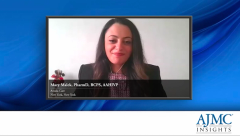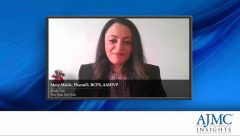
The Impact of COVID-19 on the HIV Community
Episodes in this series

Mary Malek, PharmD, BCPS, AAHIVP, of Amida Care in New York, remarks on the challenges faced by the HIV community during the COVID-19 pandemic.
Transcript:
Mary Malek, PharmD, BCPS, AAHIVP: COVID-19 [coronavirus disease 2019] has changed the way we are supporting our members with HIV or without HIV. In the beginning, there was a lot of panic, even as a health plan. We are used to working from the office; we had to get everyone computer access. We had everybody go virtual, all meetings are virtual. We had some hiccups ourselves in the beginning.
We also do a lot of work with our members that is based on face-to-face access. We have a treatment adherence program that goes out to members’ houses to help them take medications. We have outreach workers who must see patients face-to-face, to escort them to doctors’ appointments or just be with them, be there for support. Also, we do a lot of activities for our patients, fun activities to help them feel they're like everybody else, like they deserve more. Because you're a Medicaid patient and you're not able to access things yourself, we're able to help you as a health plan and give you that. We do a lot of member activities and fun activities for them as well.
However, all that stopped. We were stuck where we could not give our patients the support like we always do. But we came around really fast with this. We knew people were at home, they had access to phones. They were still able to get our calls. A lot of the people who work with us, who did face-to-face interactions, utilized phones to reach members and to be there for them.
One big initiative that we did during the beginning of COVID-19 was creating a COVID-19 assessment. We were calling all our patients, and any phone call that came in, our patients were going through an assessment with us to ask how they're doing during COVID-19. Do they have access to food? Do they have access to housing? What else can we do to help them?
From a pharmacy perspective, we were asking them, “Do you have access to a pharmacy that can deliver?Are you getting your medications delivered? We don't want you to get out of the house.” We were also asking them if they started any new medication during COVID-19 for which maybe they need a pharmacist to reach out and counsel them and help them with that. Any patient who called our plan had this assessment.
We also looked at the daily census of anybody who was hospitalized or anybody who had been tested for COVID-19, and we were able to call them, do the assessment with them, make sure all their needs are met.
The third biggest call that we made was for anybody who had a positive COVID-19 test. We had a nurse practitioner, or a physician assistant reach out to those patients, call them, and be able to support them through this tough process of hearing that they have COVID-19. Being able to support them through that was important, and it was great to use our time to do that.
As time moved on, we started getting back to the fun member activities we were used to. We had a lot of Zumba through Zoom. We had dance-a-thons, where we could see our members, they could see us.We could interact, just like we used to with the different events we used to hold for them. This was definitely important and helpful for our patients.
We also started getting back to the ways we support our members with different initiatives that we have, like the ETE initiative, ending the epidemic, and the quality initiatives. We knew, again, in the beginning, that providers were busy. They couldn't answer, so we stopped those initiatives until May. But starting in early June, middle June, we started again having ETE initiatives, working the way we usually do it, calling the providers’ offices, working with the nurses and the providers to identify patients who need more support to reach viral load suppression. And we were able to work with them again through phone calls, through different virtual platforms, to see the doctors’ offices and be able to connect again.
Unfortunately, we did have that gap from March through May, but starting in June, we got back on track, and we were able to support our members, probably not the same as we used to, but to the best of our abilities.
Newsletter
Stay ahead of policy, cost, and value—subscribe to AJMC for expert insights at the intersection of clinical care and health economics.





